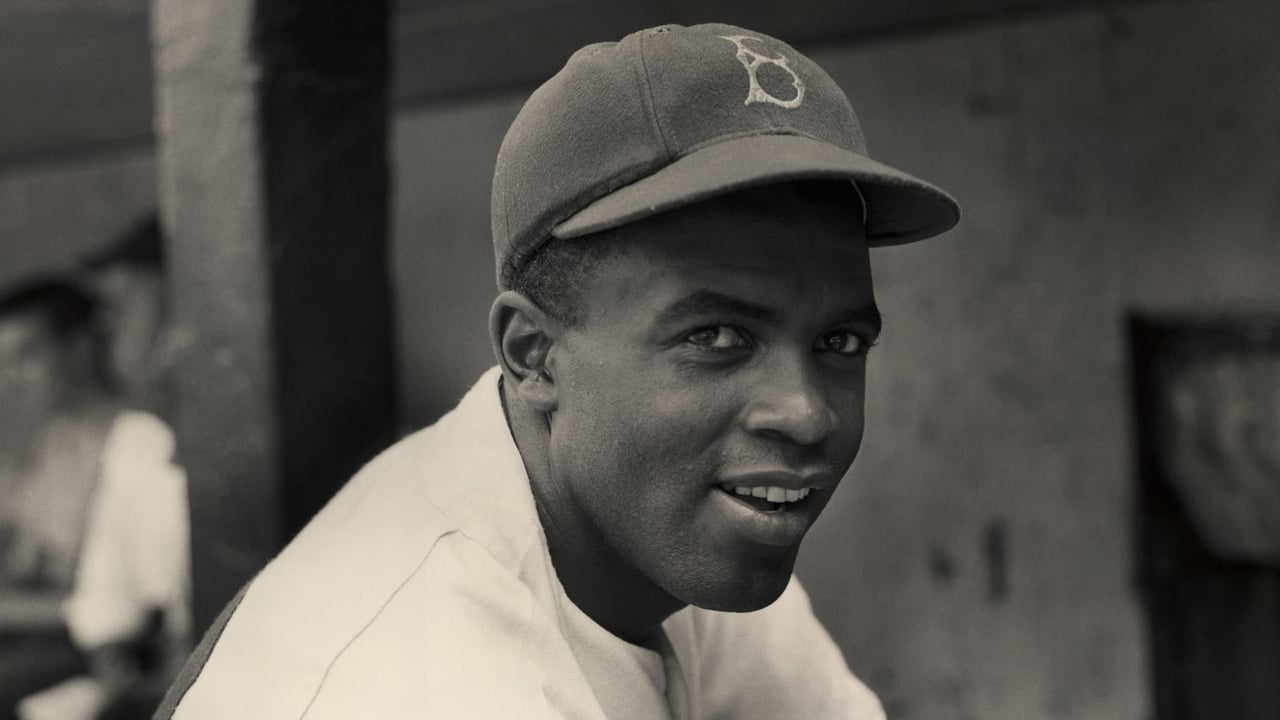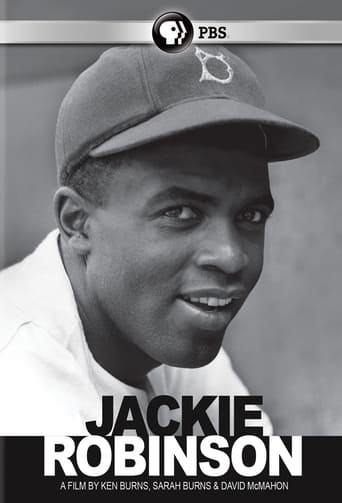KnotMissPriceless
Why so much hype?
IslandGuru
Who payed the critics
Hattie
I didn’t really have many expectations going into the movie (good or bad), but I actually really enjoyed it. I really liked the characters and the banter between them.
Phillipa
Strong acting helps the film overcome an uncertain premise and create characters that hold our attention absolutely.
Ed-Shullivan
There are no truer fans of Major League Baseball who are not familiar with the significant impact that Jackie Robinson, one of the earliest African American baseball players to be promoted up to the white major league baseball clubs, and the first African American baseball player to be playing in the modern era of professional Major League baseball had on the advancement and integration of African Americans in the United States. This documentary illustrates through many hours of actual historical footage the baseball records that Jackie Robinson contributed to such as earning a title shot in the World Series six times (6) during the ten (10) years Jackie played for the Brooklyn Dodgers as well as winning the 1955 World Series baseball title for then President and General Manager Branch Rickey and the Brooklyn Dodgers. More importantly the two narrators of this documentary, namely the top rated Hollywood actors Jamie Foxx and David Keith, outlined Jackie's life story from his birth and hometown of Cairo Georgia through his rise in and out of baseball with the many challenges and controversies as Jackie Robinson paved the way for racial integration in baseball as well as his active involvement with the civil rights movement.Jackie Robinson started with the Negro Baseball League and as the stars would align so would the business relationship and friendship between the white President and General Manager Branch Rickey of the Brooklyn Dodgers as he signed Jackie Robinson to their International League farm club the Montreal Royals in 1945. Key to this documentary are the many real and valued insights we are grateful for from Jackie's beautiful wife Rachel who shares with us the audience how Jackie and Rachel (and eventually their 3 children) had to cope with the constant racial discrimination they were exposed to daily. Rachel Robinson is an educated and articulate black woman and would seem to be a perfect match for her athlete and proud black husband Jackie Robinson. In fact the documentary outlines that the Brooklyn Dodgers President and General Manager Branch Rickey insisted that if Jackie was to be the first to successfully break the color barrier that existed in Major League Baseball he would need a strong and patient woman by his side and he encouraged Jackie and Rachel to get married to make it easier to get through the many racial challenges that they were sure to encounter over the next several years. Also contributing their own insight was two of the three Robinson children and how they expressed their pride for both of their parents shone through brightly as they described their own recollections of their childhood as black children in mainly a white dominated world. In the latter half of the documentary we are provided with the complexities of life as an African American in the mid 1950's- 1960's, and Jackie's involvement in his post-baseball life activities such as his businesses, political campaigns, the civil rights movement and his interaction with his family. I felt the documentary gives us an extremely good insight in to who Jackie Robinson was during the heyday of his professional baseball career as well as how he tried to gracefully bring the world into the 21st century and continue breaking down any and all walls that reflected race or religion. Jackie Robinson's family life was not without its own personal demons as they struggled with their eldest son's Jackie Jr. drug addiction and eventual death in a tragic car accident. Yes there have been a few biographical movies that have been produced on the life of the late and great Jackie Robinson, but if you really want to gain some insight into "WHO THE MAN" Jackie Robinson was, this documentary is a necessity as Rachel Robinson explains how her 53 year old diabetic husband made it his last dash to not steal home but to stay home and reach his arms out to Rachel to tell her he loved her before he died of a fatal heart attack brought upon by years of suffering with diabetes.Jackie Robinson was a black man, a proud father, the first African American professional Major League Baseball player in the modern era, who tried to make the world a better place for all races. It is a must see if you are a fan Jackie Robinson or of baseball and if you would like to learn more about the struggles of the civil rights movement. Jackie Robinson's jersey number was 42 with the Brooklyn Dodgers, but the best I can do in rating this film on the life of the great Jackie Robinson is a perfect 10 for 10! Don't miss seeing it!!
John T. Ryan
TO VIEW THE life of Jackie Robinson simply from the point of view as a baseball player is to ignore about 7/8 of the man. Although it was his appearance center stage on the World scene due to his playing the game very, very well; his other accomplishments were equally as singularly unique and overwhelming in shaping our future.WHEN ONE HEARS of Jackie's having to agree to remain silent and not retaliate against whatever abuse came his way, it seems incredible that a man could endure and live up to such. We have often wondered if such internalization of this tension contributed to his later deteriorating health and physical condition. Did it shorten his life expectancy? THE FACT IS obvious that film maker, Ken Burns is a true admirer of Mr. Robinson. This we say is central to our critical analysis and it does somewhat of a disservice to the mini-series. Mr. Burns inclination to get before the camera and speak as an expert on Jackie's career.OTHER THAN THAT one little self indulgent bit of business (understandable and forgivable), Filmmaker Burns interjects some other bit of himself by revealing much of his own political leanings.OUR REFERENCE TO this concerns mention of the 1964 Presidential Election and campaign leading up to same. The election was between Democratic standard bearer, the incumbent Lyndon B. Johnson (Hubert H. Humphrey VP) and Arizona Senator, Barry M. Goldwater (William Miller, VP). The election was Landslide in favor of Johnson.BUT THE CHARACTERIZATION of Mr. Goldwater was not exactly rendered in an impartial and even handed manner. We are told that Jackie Robinson believed him to be a bigot, yet we don't hear that from Jackie's own words. The blame is put on Goldwater's failure to vote yes on the Civil Rights Act of that year.* WE ARE INFORMED in the film, however, that Jackie Robinson was a Republican and did support Richard M. Nixon over John F. Kennedy in the 1960 Presidential contest.IN CONSIDERING THE entire length of the mini-series, we did enjoy it for its multi-faceted examination of the Man's accomplishments in any of the other fields outside of Baseball. But, for all of its lengthy on screen duration, we really learned little about Mr. Robinson that we didn't know before. It does appear to have originated as a creative use of footage originally shot for Ken Burns' BASEBALL.NOTE: * Voting negatively on a particular bill does not necessarily serve as prima facia evidence of racial bigotry. Serving as evidence to the contrary are two other well known facts: 1) Barry Goldwater was a founding member of the Arizona NAACP.2) As commanding General of the Arizona Air National Guard, it was Goldwater who ordered it to be desegregated.
steve-575
Ken Burns hits a home run with this documentary chronicling the life of Jackie Robinson. This PBS documentary is about as complete of a biography as you will see on the baseball legend. It includes rare footage from Jackie's playing career, interviews with friends, teammates and family (including Jackie's 93 year-old widow), and clips from Jackie's post-career endeavors.Unlike the previous movies and biographies, the documentary highlights Jackie's failures as well as his triumphs. While "42" was a terrific movie, it only focused on Jackie's early career when he broke the color barrier and the short time following it. This documentary highlights the years following Jackie's breakthrough where he became much more outspoken and ruffled many feathers among teammates and media members. It also documents Jackie's post playing career where he faced a backlash due to his political views and had a strained relationship with his eldest son who preceded him in death. While most people would have been satisfied with a place in baseball history and a peaceful retirement, Jackie continued the fight for black civil rights even as his health took a turn for the worst. Younger athletes like Muhammad Ali and Jim Brown were becoming the voice of the 1960s civil rights movement and Jackie's influence began to fade. As with the case of many legends, Jackie's impact was not fully realized until many years after his death.In the end, this 4-hour journey helps to establish a more human perspective of Jackie Robinson's life while not tarnishing his legacy.
SnoopyStyle
Ken Burns brings a two-part four-hour documentary on the life of legendary baseball hero Jackie Robinson. He faced racism in Pasadena as well as his Olympian brother. His Army tour is derailed by a court martial. It looks at his groundbreaking role in the major leagues and his life after baseball especially his role in the civil rights movement as a Rockefeller Republican.This is a solid in-depth look at his life. He is popularly seen as the stoic representation of the saintly hard-working black man who faced down unrelenting racism with class and perseverance. This documentary adds on top of the popular myth with his unending, fierce, and unquiet battles with racism. The image is a strain and an incomplete construct. Honestly, I never knew about Jackie's brother's amazing story. The main thing missing is Jackie Robinson's own voice in his early life. He has limited recordings and overwhelmed by the aura that he himself created during that time. This has the Ken Burns style with the constant narration. It is certainly a good basis to get a fuller understanding of the man more than the superficial image.

